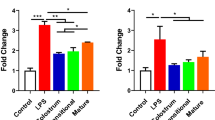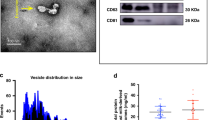Abstract
Background
Human breast milk (HBM), which contains an abundant supply of exosomes, is known to prevent necrotizing enterocolitis (NEC). Preterm infants are commonly given pasteurized donor milk when HBM is unavailable. However, pasteurization can disrupt its components. This study investigates the effects of both raw and pasteurized HBM-derived exosomes on intestinal inflammation.
Methods
HBM exosomes were isolated and characterized by positive CD63 and negative calnexin markers from western blot, nanoparticle tracking analysis and transmission electron microscopy. Mouse intestine organoids were established and treated with exosomes from raw or pasteurized HBM in healthy and injury conditions. Following ethical approval (#44032), mice pups were randomly assigned to (1) breastfed control; (2) NEC; (3) NEC receiving raw HBM exosomes; (4) NEC receiving pasteurized HBM exosomes. NEC was induced by hypoxia, gavage feeding and lipopolysaccharide (LPS). Ileum was evaluated. Data were analyzed using one-way ANOVA with Bonferroni post-test.
Results
Both raw and pasteurized HBM exosomes decreased inflammation in hypoxia and LPS-treated organoids compared to control. In vivo, NEC-induced mucosal injury, inflammation and mucous production were improved by raw and pasteurized HBM-derived exosomes.
Conclusions
Exosomes derived from raw and pasteurized HBM equally reduced intestinal damage. Exosome administration in clinical practice requires further investigation.






Similar content being viewed by others
References
Neu J, Walker WA (2011) Necrotizing enterocolitis. N Engl J Med 364:255–264
Nino DF, Sodhi CP, Hackam DJ (2016) Necrotizing enterocolitis: new insights into pathogenesis and mechanisms. Nat Rev Gastroenterol Hepatol 13:590–600
Tam PKH, Chung PHY, St Peter SD et al (2017) Advances in paediatric gastroenterology. Lancet 390:1072–1082
Lin PW, S BJ (2006) Necrotizing enterocolitis. Lancet 368:1271–1283
Maffei D, Schanler RJ (2017) Human milk is the feeding strategy to prevent necrotizing enterocolitis. Semin Perinatol 41:36–40
Cortez J, Kraemer DF, Neu J et al (2018) Maternal milk feedings reduce sepsis, necrotizing enterosolitis and improve outcomes of premature infants. J Perinatol 38:71–74
O’Connor DL, Gibbins S, Kiss A et al (2016) Effect of supplemental donor human milk compared with preterm formula on neurodevelopment of very low-birth-weight infants at 18 months: a randomize clinical trial. JAMA 316:1897–1905
Quigley M, Embleton ND, McMuire W (2018) Formula versus donor breast milk for feeding preterm or low birth weight infants. Cochrane Database of Syst Rev 6:CD002971.
Section on Breastfeeding (2012) Breastfeeding and the use of human milk. Pediatrics 129:e827–841
Johnstone RM, Adam M, Hammond JR et al (1987) Vesicle formation during reticulocyte maturation. Association of plasma membrane activities with released vesicles (exosome). J Biol Chem 262:9412–9420
Munagala R, Aqil F, Jeyabalan J et al (2016) Bovine milk-derived exosomes for drug delivery. Cancer Lett 371:48–61
Pieters BC, Arntz OJ, Bennink MB et al (2015) Commercial cow milk contains physically stable extracellular vesicles expressing immunoregulatory TGF-β. PLoS ONE 10:e0121123
Li B, Hock A, Wu RY et al (2019) Bovine milk-derived exosomes enhance goblet cell activity and prevent the development of experimental necrotizing enterocolitis. PLoS ONE 14:e0211431
Wang X, Yan X, Zhang L et al (2019) Identification and peptidomic profiling of exosomes in preterm human milk: insights into necrotizing enterocolitis prevention. Mol Nutr Food Res e1801247.
Momen-Heravi F (2017) Isolation of extracellular vesicles by ultracentrifugation. Methods Mol Biol 1660:25–32
Li B, Lee C, Filler T, Hock A, Wu RY, Li Q et al (2017) Inhibition of corticotropin-releasing hormone receptor 1 and activation of receptor 2 protect against colonic injury and promote epithelium repair. Sci Rep 7:46616
Li B, Lee C, Cadete M et al (2019) Neonatal intestinal organoids as an ex vivo approach to study early intestinal epithelial disorders. Pediatr Surg Int 35:3–7
Barlow B, Santulli TV, Heird WC et al (1974) An experimental study of acute neonatal enterocolitis—the importance of breast milk. J Pediatr Surg 9:587–595
Zani A, Cordischi L, Cananzi M et al (2008) Assessment of a neonatal rat model of necrotizing enterocolitis. Eur J Pediatr Surg 18:423–426
Schandler RJ, Lau C, Hurst NM et al (2005) Randomized trial of donor human milk versus preterm formula as substitutes for mother’s own milk in the feeding of extremely premature infants. Pediatrics 116:400–406
Ewaschuk JB, Unger S, Harvey S et al (2011) Effect of pasteurization on immune components of milk: implications for feeding preterm infants. Appl Physiol Nutr Metab 36:175–182
Rager T, Olson JK, Zhou Y et al (2016) Exosomes secreted from bone marrow-derived mesenchymal stem cells protect the intestines from experimental necrotizing enterocolitis. J Pediatr Surg 51:942–947
Wang Y, Tian J, Tang X et al (2016) Exosomes released by granulocytic myeloid-derived suppressor cells attenuate DSS-induced colitis in mice. Oncotarget 7:15356–15368
Saha S, Aranda E, Hayakawa Y et al (2016) Macrophage-derived extracellular vesicle-packaged WNTs rescue intestinal stem cells and enhance survival after radiation injury. Nat Commun 7:13096
Kahn S, Liao Y, Du X et al (2018) Exosomal microRNAs in milk from mothers delivering preterm infants survive in vitro digestion and are taken up by human intestinal cells. Mol Nutr Food Res 62:1701050
Martin C, Patel M, Williams S et al (2018) Human breast milk-derived exosomes attenuate cell death in intestinal epithelial cells. Innate Immun 24:278–284
Walker WA (2002) Development of the intestinal mucosal barrier. J Pediatr Gastroenterol Nutr 34:S33–S39
Hackam DJ, Upperman JS, Grishin A et al (2005) Disordered enterocyte signaling and intestinal barrier dysfunction in the pathogenesis of necrotizing enterocolitis. Semin Pediatr Surg 14:49–57
Martin NA, Patric SKM, Estrada TE et al (2011) Active transport of bile acids decreases Mucin 2 in neonatal ileum: implications for development of necrotizing enterocolitis. PLoS ONE 6:e27191
Clark JA, Doelle SM, Halpern MD et al (2006) Intestinal barrier failure during experimental necrotizing enterocolitis: protective effect of EGF treatment. Am J Physiol Gastrointest Liver Physiol 291:G938–G949
Funding
Dr. Agostino Pierro was funded by Canadian Institutes of Health Research (CIHR) Foundation Grant (Grant number 353857) and the endowment of the Robert M. Filler Chair of Surgery.
Author information
Authors and Affiliations
Contributions
HM, CL, SC, and MB: conception and design, collection and/or assembly of data, data analysis and interpretation, manuscript writing, and final approval of manuscript. MP, BL, SS, and DO: collection and/or assembly of data, data analysis and interpretation, and final approval of manuscript. AP: conception and design, financial support, and final approval of manuscript.
Corresponding author
Ethics declarations
Conflict of interest
The authors declare that they have no conflict of interest.
Ethical approval
This article does not contain any studies with human participants performed by any of the authors. All procedures performed in studies involving animals were in accordance with the ethical standards of the Animal Care Protocol of the Hospital for Sick Children at which the studies were conducted (Animal Care Committee AUP #44032). All applicable international, national, and/or institutional guidelines for the care and use of animals were followed.
Additional information
Publisher's Note
Springer Nature remains neutral with regard to jurisdictional claims in published maps and institutional affiliations.
Rights and permissions
About this article
Cite this article
Miyake, H., Lee, C., Chusilp, S. et al. Human breast milk exosomes attenuate intestinal damage. Pediatr Surg Int 36, 155–163 (2020). https://doi.org/10.1007/s00383-019-04599-7
Accepted:
Published:
Issue Date:
DOI: https://doi.org/10.1007/s00383-019-04599-7




